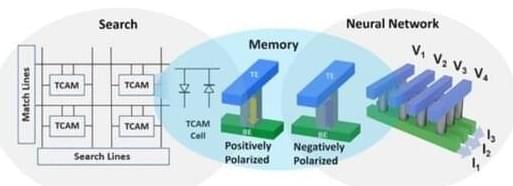Some mathematicians have sought a logical proof for the existence of God. Here’s what they discovered.


This is perhaps the strangest thing about the arrow of time: “It only lasts for a little while,” says Carroll.
It’s very hard to picture what might happen if the arrow of time eventually vanishes. “When we think we produce heat in our neurons,” says Rovelli. “Thinking is a process in which the neuron needs entropy to work. Our sense of time passing is just what entropy does to our brain.”
The arrow of time that arises from entropy brings us a long way closer to understanding why time only goes forward. But there may be more arrows of time than this one – in fact there is arguably an entire volley of arrows of time pointing from the past to the future. To understand these, we have to step from physics into philosophy.


Electronic computing and communications have advanced significantly since the days of radio telegraphy and vacuum tubes. In fact, consumer devices now contain levels of processing power and memory that would be unimaginable just a few decades ago.
But as computing and information processing microdevices get ever smaller and more powerful, they are running into some fundamental limits imposed by the laws of quantum physics. Because of this, the future of the field may lie in photonics—the light-based parallel to electronics. Photonics is theoretically similar to electronics but substitutes photons for electrons. They have a huge potential advantage in that photonic devices may be capable of processing data much faster than their electronic counterparts, including for quantum computers.
Add analog and air-driven to the list of control system options for soft robots.
In a study published online this week, robotics researchers, engineers and materials scientists from Rice University and Harvard University showed it is possible to make programmable, nonelectronic circuits that control the actions of soft robots by processing information encoded in bursts of compressed air.
“Part of the beauty of this system is that we’re really able to reduce computation down to its base components,” said Rice undergraduate Colter Decker, lead author of the study in the Proceedings of the National Academy of Sciences. He said electronic control systems have been honed and refined for decades, and recreating computer circuitry “with analogs to pressure and flow rate instead of voltage and current” made it easier to incorporate pneumatic computation.
Engineers at UC Riverside have unveiled an air-powered computer memory that can be used to control soft robots. The innovation overcomes one of the biggest obstacles to advancing soft robotics: the fundamental mismatch between pneumatics and electronics. The work is published in the open-access journal, PLOS One.
Pneumatic soft robots use pressurized air to move soft, rubbery limbs and grippers and are superior to traditional rigid robots for performing delicate tasks. They are also safer for humans to be around. Baymax, the healthcare companion robot in the 2014 animated Disney film, Big Hero 6, is a pneumatic robot for good reason.
But existing systems for controlling pneumatic soft robots still use electronic valves and computers to maintain the position of the robot’s moving parts. These electronic parts add considerable cost, size, and power demands to soft robots, limiting their feasibility.

Artificial intelligence presents a major challenge to conventional computing architecture. In standard models, memory storage and computing take place in different parts of the machine, and data must move from its area of storage to a CPU or GPU for processing.
The problem with this design is that movement takes time. Too much time. You can have the most powerful processing unit on the market, but its performance will be limited as it idles waiting for data, a problem known as the “memory wall” or “bottleneck.”
When computing outperforms memory transfer, latency is unavoidable. These delays become serious problems when dealing with the enormous amounts of data essential for machine learning and AI applications.

Additive manufacturing techniques used to produce metal alloys have gained popularity due to their ability to be fabricated in complex shapes for use in various engineering applications. Yet the majority of studies conducted have centered around developing single-phase materials.
Dr. Kelvin Xie’s team in the Department of Materials Science and Engineering at Texas A&M University employed advanced characterization techniques to reveal the microstructure of the 3D-printed dual-phase multi-principal elements, also known as high entropy alloys (HEAs), that display ultra-strong and ductile properties. This work is a collaboration with Dr. Wen Chen from the University of Massachusetts at Amherst and Dr. Ting Zhu from the Georgia Institute of Technology.
This study was recently published in Nature.

A world-first study led by Monash University engineers has demonstrated how cutting-edge 3D-printing techniques can be used to produce an ultra strong commercial titanium alloy—a significant leap forward for the aerospace, space, defense, energy and biomedical industries.
Australian researchers, led by Professor Aijun Huang and Dr. Yuman Zhu from Monash University, used a 3D-printing method to manipulate a novel microstructure. In doing so, they achieved unprecedented mechanical performance.
This research, published in Nature Materials, was undertaken on commercially available alloys and can be applied immediately.

Laser powder bed fusion, a 3D-printing technique, offers potential in the manufacturing industry, particularly when fabricating nickel-titanium shape memory alloys with complex geometries. Although this manufacturing technique is attractive for applications in the biomedical and aerospace fields, it has rarely showcased the superelasticity required for specific applications using nickel-titanium shape memory alloys. Defects generated and changes imposed onto the material during the 3D-printing process prevented the superelasticity from appearing in 3D-printed nickel-titanium.
Researchers from Texas A&M University recently showcased superior tensile superelasticity by fabricating a shape memory alloy through laser powder bed fusion, nearly doubling the maximum superelasticity reported in literature for 3D printing.
This study was recently published in vol. 229 of the Acta Materialia journal.